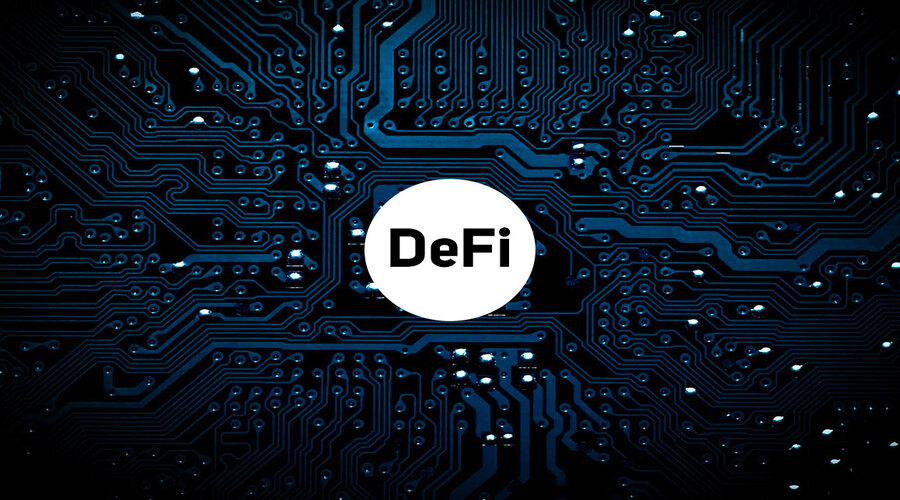Decentralized Finance (DeFi) is revolutionizing the traditional financial landscape by leveraging the power of smart contracts and blockchain technology. In this article, we will explore the fundamentals of smart contracts and delve into the world of DeFi, examining its key components, benefits, use cases, challenges, and future innovations.
Introduction to Smart Contracts and Decentralized Finance (DeFi)
Smart contracts are self-executing agreements with predefined rules and conditions encoded on a blockchain. They eliminate the need for intermediaries by automating and enforcing contractual obligations transparently and securely. Decentralized Finance, or DeFi, refers to the ecosystem of financial applications built on decentralized networks, enabling permissionless access to financial services, such as lending, borrowing, trading, and asset management.
The Fundamentals of Smart Contracts

To understand DeFi, it’s crucial to grasp the fundamentals of smart contracts. We will explore the core concepts behind smart contracts, including their functionality, structure, programming languages (such as Solidity), and the underlying blockchain platforms where they are deployed, such as Ethereum.
Understanding Decentralized Finance (DeFi)
DeFi is transforming the traditional financial system by offering open, accessible, and inclusive financial services to anyone with an internet connection. We will delve into the principles and characteristics of DeFi, including decentralization, transparency, composability, and the removal of intermediaries.
Key Components of DeFi Ecosystem
The DeFi ecosystem comprises various components that work together to provide a wide range of financial services. We will examine these key components, such as decentralized exchanges (DEXs), lending platforms, stablecoins, yield farming protocols, and insurance platforms, exploring how they interact and contribute to the overall DeFi ecosystem.
Benefits of Smart Contracts in DeFi
Smart contracts bring several advantages to the DeFi landscape. We will discuss these benefits, including transparency, security, efficiency, programmability, and the potential for composability, which allows different DeFi protocols to seamlessly interact and create new innovative applications.
Smart Contract Use Cases in DeFi
The utilization of smart contracts in DeFi extends to various use cases. We will explore the practical applications of smart contracts in decentralized lending and borrowing, automated market making, decentralized exchanges, stablecoin issuance, yield farming, liquidity mining, and risk management solutions within the DeFi ecosystem.
Decentralized Lending and Borrowing
Decentralized lending and borrowing platforms allow individuals to lend or borrow digital assets without the need for traditional intermediaries. We will examine how smart contracts facilitate these processes, enabling transparent and secure lending/borrowing operations while eliminating geographical barriers and credit restrictions.
Automated Market Making and Decentralized Exchanges
Automated market making (AMM) algorithms, powered by smart contracts, play a vital role in decentralized exchanges (DEXs). We will explore how AMMs ensure liquidity, enable seamless asset exchange, and facilitate decentralized trading. Smart contracts provide the underlying mechanisms for executing trades, determining prices based on supply and demand, and maintaining liquidity pools.
Stablecoins and Decentralized Stablecoin Issuance
Stablecoins are cryptocurrencies designed to maintain a stable value, often pegged to a fiat currency. Smart contracts enable the creation and management of stablecoins within the DeFi ecosystem. We will explore different approaches to decentralized stablecoin issuance, including collateralized stablecoins, algorithmic stablecoins, and their role in facilitating efficient transactions and reducing volatility in DeFi.
Yield Farming and Liquidity Mining
Yield farming and liquidity mining are innovative concepts that incentivize users to provide liquidity to DeFi protocols in exchange for rewards. These mechanisms are powered by smart contracts, which automate the distribution of rewards and the calculation of yields based on predefined rules. We will discuss the opportunities, risks, and potential returns associated with yield farming and liquidity mining.
Insurance and Risk Management in DeFi
Risk management is a crucial aspect of the DeFi ecosystem. Smart contracts can facilitate the creation of decentralized insurance platforms that offer coverage against smart contract vulnerabilities, hacks, and other risks. We will explore how these insurance protocols operate, leveraging smart contracts to automate the underwriting, premium payments, and claims settlement processes.
Challenges and Risks in DeFi
While DeFi presents numerous opportunities, it also comes with challenges and risks. We will examine some of the common challenges in DeFi, including scalability limitations, security vulnerabilities, regulatory uncertainties, and the potential for smart contract bugs or exploits. Understanding these challenges is essential for users and developers to navigate the DeFi landscape safely.
Security Considerations and Auditing in DeFi
Security is paramount in DeFi applications. Smart contract vulnerabilities can result in substantial financial losses. We will discuss the importance of rigorous smart contract auditing, code reviews, and security best practices to mitigate the risks associated with DeFi protocols. Additionally, we will explore the emergence of decentralized auditing solutions to enhance transparency and security in the DeFi space.
Regulatory Landscape for DeFi
The regulatory environment surrounding DeFi is still evolving. We will examine the regulatory challenges and considerations for DeFi projects, including compliance with anti-money laundering (AML) and know-your-customer (KYC) requirements, potential securities regulations, and the importance of promoting responsible innovation while protecting users’ interests.
Future Outlook and Innovations in Smart Contracts and DeFi
- Cross-chain Interoperability: The integration of cross-chain interoperability solutions will enable seamless asset transfers and data exchange between different blockchain networks. This will enhance liquidity and open up opportunities for decentralized finance across multiple blockchains.
- Scalability Solutions: Scalability remains a challenge for blockchain networks. Innovations such as layer 2 solutions, sharding, and sidechains aim to improve transaction throughput and reduce fees, making DeFi more accessible and cost-effective.
- Oracle Networks for Real-world Data Integration: Oracle networks will continue to evolve, providing reliable and secure connections between smart contracts and real-world data sources. This will enable smart contracts to access external information, such as market prices, weather data, or IoT sensor readings, enhancing the functionality and versatility of DeFi applications.
- Decentralized Identity (DID): The development of decentralized identity solutions will empower individuals to control their digital identities securely. Decentralized identity protocols will integrate with smart contracts, enabling self-sovereign identity management and facilitating trustless interactions within the DeFi ecosystem.
- Convergence of DeFi and Traditional Finance: As DeFi matures, we may witness a convergence between decentralized finance and traditional financial institutions. This could involve the adoption of smart contracts by banks, asset management firms, and other financial intermediaries to streamline processes, enhance transparency, and improve efficiency.
- Regulatory Framework and Compliance: As DeFi gains mainstream attention, regulatory frameworks will likely evolve to provide clarity and protect participants. Regulatory compliance measures, including Know Your Customer (KYC) and Anti-Money Laundering (AML) procedures, may become more prevalent in DeFi applications.
- Interoperability with Traditional Financial Systems: Efforts to bridge the gap between DeFi and traditional financial systems will likely increase. Integration with existing financial infrastructure, such as payment gateways or banking systems, will facilitate the adoption of DeFi solutions by a broader user base.
- Enhanced Security and Auditing: With the growing value locked in DeFi protocols, there will be an increased focus on security measures and smart contract auditing. Improved security practices, code audits, and decentralized auditing solutions will play a vital role in mitigating risks and protecting user funds.
- Expansion of DeFi Use Cases: DeFi will expand beyond its current focus on lending, borrowing, and trading. We can expect innovative use cases such as decentralized insurance, decentralized derivatives, prediction markets, and more, as the ecosystem continues to evolve.
- Mainstream Adoption and User Experience: As user experience improves and DeFi applications become more intuitive, we can anticipate broader adoption by non-technical users. User-friendly interfaces, simplified onboarding processes, and seamless integration with traditional financial services will contribute to the mainstream adoption of DeFi
Decentralized Asset Management and Investment Platforms
Decentralized asset management platforms enable individuals to create and manage investment portfolios using smart contracts. These platforms leverage automation and blockchain technology to offer transparent, accessible, and customizable investment solutions. We will explore how smart contracts facilitate decentralized asset management, including portfolio rebalancing, automated investment strategies, and tokenization of assets.
Governance and Decentralized Autonomous Organizations (DAOs)
Decentralized Autonomous Organizations (DAOs) are organizations governed by smart contracts and the consensus of their token holders. DAOs enable participants to collectively make decisions, manage funds, and govern the direction of a project or community. We will delve into how smart contracts empower decentralized governance and the potential for increased transparency, inclusivity, and community-driven decision-making.
Cross-Chain Interoperability and Smart Contract Oracles
Cross-chain interoperability is essential for the seamless exchange of assets and information across different blockchain networks. Smart contracts play a crucial role in enabling interoperability by facilitating secure communication and asset transfers between disparate blockchains. We will explore the concept of smart contract oracles and their role in bridging the gap between on-chain and off-chain data, enabling smart contracts to access real-world information.
Decentralized Identity and Self-Sovereign Identity (SSI)
Decentralized identity solutions aim to give individuals control over their personal data and digital identities. Smart contracts can play a vital role in establishing self-sovereign identity (SSI) systems, where individuals can manage and share their identity information securely and selectively. We will discuss the potential of smart contracts in enabling decentralized identity and its applications in areas such as KYC/AML processes, digital credentials, and privacy-preserving authentication.
Smart Contracts and Supply Chain Integration
Smart contracts can streamline supply chain processes by automating interactions between different stakeholders, including manufacturers, suppliers, logistics providers, and customers. We will explore how smart contracts facilitate supply chain integration by automating order fulfillment, tracking shipments, verifying product authenticity, and managing payments. This integration improves transparency, efficiency, and trust in supply chain operations.
Smart Contracts in Intellectual Property Rights Management
Intellectual property (IP) rights management can benefit from the transparency and immutability provided by smart contracts. We will discuss how smart contracts can be used to enforce IP rights, automate licensing agreements, track usage, and ensure fair compensation for creators. This application of smart contracts empowers creators, reduces disputes, and enhances the efficiency of IP management.
Energy Trading and Smart Contracts
Smart contracts have the potential to transform the energy trading sector by enabling peer-to-peer energy transactions, automated settlement, and transparent pricing. We will explore how smart contracts can facilitate energy trading between producers and consumers, optimize energy distribution, and support the integration of renewable energy sources into the grid.
Smart Contracts in Healthcare and Medical Records Management
Smart contracts can revolutionize healthcare systems by ensuring secure and interoperable management of medical records, consent management, and insurance claims. We will discuss how smart contracts enhance data privacy, streamline healthcare workflows, enable patient-centric control over medical records, and facilitate efficient insurance settlements.
Conclusion
Smart contracts and decentralized finance (DeFi) are reshaping the financial landscape by introducing transparency, accessibility, and programmability. Through the power of smart contracts, DeFi protocols enable individuals worldwide to access a wide range of financial services in a secure and permissionless manner. However, it’s essential to navigate the risks and challenges associated with this emerging ecosystem.
As the adoption of smart contracts and DeFi continues to grow, it’s crucial for users and developers to prioritize security, conduct thorough due diligence, and stay informed about the evolving regulatory landscape. By doing so, we can unlock the full potential of smart contracts and DeFi, revolutionizing how we transact, invest, and participate in the global financial system.





